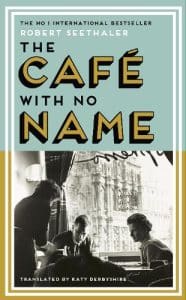
 This is the fourth novel by Robert Seethaler I’ve reviewed on here. The first was A Whole Life which sees a man lead a simple yet rich life, leaving his alpine valley just once. After that I snapped up both The Tobacconist and The Field as soon as they appeared. All offer a slice of Austrian life delivered with wit and humanity. Opening in 1960s Vienna, The Café with No Name does the same, following Robert Simon, an orphan whose dream is to run a bar, against a backdrop of a social change as post-war Vienna picks itself up again.
This is the fourth novel by Robert Seethaler I’ve reviewed on here. The first was A Whole Life which sees a man lead a simple yet rich life, leaving his alpine valley just once. After that I snapped up both The Tobacconist and The Field as soon as they appeared. All offer a slice of Austrian life delivered with wit and humanity. Opening in 1960s Vienna, The Café with No Name does the same, following Robert Simon, an orphan whose dream is to run a bar, against a backdrop of a social change as post-war Vienna picks itself up again.
The newspapers wrapped around the fishmonger’s Danube trout and char were full of reports on major advances. A radiant future apparently rising from the morass of the past.
Simon, as Seethaler refers to him throughout, works as a handyman at a market, known to all the stallholders and encouraged to take over the empty café by the butcher whose shop is opposite. Simon sets about giving the place a face lift, opening his doors to a steady stream of customers, many of whom will become regulars over the years, needing help before too long. Practical and no nonsense, Mila becomes virtually indispensable, eventually falling in love with René, one of the wrestlers at the nearby fairground. Simon has little time for a life of his own, brief hopes of love for an erratic young woman dashed, instead going home to the war widow in whose house he’s lodged for years but still feels he barely knows. As the years roll by, happiness is embraced, small tragedies play out, the occasional drama flares up, all commented on by the two ladies who like to share a drink together every day.
Simon stood behind the bar and held glasses up to the light to check their shine, and when he turned around to put a glass on the shelf he saw himself in the mirror with his apron, the pencil behind his ear and an expression of quiet incredulity on his face.
Seethaler excels at writing about everyday life from the perspective of ordinary people. Nothing much happens in his novels, yet they are full of rich detail, humanity and humour. A café is the perfect setting for his themes. Some of his cast of regulars come to the fore – the butcher frets about yet another child on the way, quickly coming round to the idea with joy; Mila picks herself up after a terrible loss which will never leave her. Others like Harald, the war veteran who likes to remove his glass eye and roll it across the table, remain in the background. The occasional chapters in which the two ladies pass comment and remember their past were a particular delight. Another Seethaler triumph, expertly translated by Katy Derbyshire who captures the narrative’s nuance beautifully just as Charlotte Collins, the translator of the previous three, did.
Canongate Books Edinburgh 9781837260140 224 pages Hardback (read via NetGalley)






